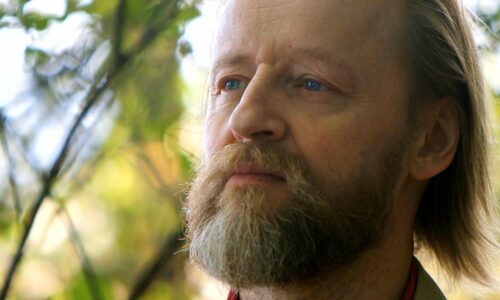Conversation 10 with Allan W. Anderson, San Diego, 1974 (excerpt)
Krishnamurti: It is very important to find out what it is to see, to perceive; what it is to hear. Do I ever hear?
When one is married, as a wife or a husband, or a girl or a boy, do I ever hear her or him? Or, I hear her or him through the image I have built about her or him? Through the screen of irritations, screen of annoyance, domination, you know, all those dreadful things that come into relationship.
So, do I ever hear directly what you say – without translating, without transforming it, without twisting it? Do I ever hear a bird cry, or a child weep, or a man crying in pain? Do you follow, Sir? Do I ever hear anything?
Anderson: In a conversation we had about a year ago, I was very struck by something you said which I regard as for myself, personally, immensely valuable. You said that hearing was doing nothing to stop or interfere with seeing. Hearing is doing nothing to stop seeing. That is very remarkable because in conversation the notion of hearing is regarded as intimately associated with command. We will say, won’t we: ‘Now, hear me! Hear me out!’ And the person thinks that they have to lean forward in the sense of do something voluntarily.
K: Right.
A: It’s as though they have to screw themselves up into some sort of agonized twist here, not only to please the one who is insisting that they are not hearing, but to get up some hearing on their own.
K: Right.So, does a human being, Y or X, listen at all? And what takes place when I do listen? Listen in the sense without any interference, without any interpretation, conclusion, like and dislike, you know, all that takes place. What happens when I actually listen?
Sir, look, we said just now, we cannot possibly understand what beauty is if we don’t understand suffering, passion. You hear that statement, what does the mind do? It draws a conclusion. It has formed an idea, verbal idea, hears the words, draws a conclusion, and an idea. Say, a statement of that kind has become an idea. Then we might say: ‘How am I to carry out that idea?’ And that becomes a problem.
A: Yes, of course it does because the idea doesn’t conform to nature. And other people have other ideas, and they want to get theirs embodied. Now we’re up against a clash.
K: Yes. So, can I listen to that, can the mind listen to that statement without forming an abstraction? Just listen. I neither agree nor disagree, just actually listen completely to that statement.
A: If I am following you, what you are saying is that: Were I to listen adequately? Or just let’s say ‘listen’ because it’s not a question of more or less. I am absolutely listening, or I am absolutely not listening.
K: That’s right, Sir.
A: I would not have to contrive an answer.
K: No. You are in it!
A: Yes. So, like the cat, the action and the seeing are one.
Ki: Yes.
A: They are one act.
K: That’s right. So, can I listen to a statement, and see the truth of the statement, or the falseness of the statement, not in comparison, but in the very statement that you are making? I don’t know if I am making myself clear.
A: Yes, you are making yourself very clear.
K: That is, I listen to the statement: ‘Beauty can never exist without passion, and passion comes from sorrow’. I listen to that statement; I don’t abstract an idea of it, or make an idea from it. I just listen. What takes place? You may be telling the truth, or you may be making a false statement. I don’t know because I am not going to compare.
A: No. You are going to see.
K: I just listen which means, I am giving my total attention – just listen to this, Sir. You’ll see what’s going on. I give my total attention to what you are saying. Then it doesn’t matter what you say, or don’t say. You see this thing?
A: Of course, of course.
K: What is important is my act of listening! And that act of listening has brought about a miracle of complete freedom from all your statements – whether true, false, real – my mind is completely attentive. Attention means no border.
The moment I have a border, I begin to fight you – agree, disagree… The moment attention has a frontier, then concepts arise. But if I listen to you completely, without a single interference of thought or ideation or mentation, just listen to that, the miracle has taken place which is: My total attention absolves me, my mind from all the statements. Therefore, my mind is extraordinarily free to act.
A: This has happened to me on this series of our conversations. With each one of these conversations since this has been video-taped, one begins when one is given the sign, and we’re told when the time has elapsed, and one ordinarily, in terms of activity in this sort, is thinking about the production as such. But one of the things that I have learnt is, in our conversations, I’ve been listening very intensely, and yet, I’ve not had to divide my mind. And yet, this is, if I am responding correctly to what you have been teaching – well, I know you don’t like that word – but to what you have been saying, and I understand why ‘teaching’ was the wrong word here. There is that very first encounter that the mind engages itself in. How can I afford not to make the distinction between paying attention to the aspects of the program on a production aspect of it, and still engage our discussion?
K: Right. You can do it!
A: But the more intensely I engage, the more efficiently all the mechanism is accomplished. We don’t believe that in the sense that, not only to start with will we not believe it, but we won’t even try it out! There is no guarantee from anybody in advance. What we’re told rather is this: ‘Well, you get used to it.’ And yet, performers have stage-fright all their lives. So, clearly, they don’t get used to it.
K: No, Sir, don’t you think it is because our minds are so commercial! Unless I get a reward from it, I won’t do a thing. And my mind lives in the marketplace – one’s mind: I give you this, give me that.
A: And there’s an interval in between.
K: You follow?
A: Right.
K: We are so used to commercialism – both spiritually and physically -, that we don’t do anything without a reward, without gaining something, without a purpose. It all must be exchange, not a gift, but exchange: I give you this, and you give me that. I torture myself religiously, and God must come to me. It’s all a matter of commerce.
A: Fundamentalists have a phrase that comes to mind with respect to their devotional life. They say: ‘I am claiming the promises of God.’ And this phrase, in the context of what you are saying, my goodness, what that couldn’t lead to in the mind!
K: I know. So, you see, when one goes very deeply into this, when action is not based on an idea, formula, belief, then seeing is the doing. Then, what is seeing, and hearing, which we went into? Then, the seeing is complete attention, and the doing is in that attention. And the difficulty is, people will ask, how will you maintain that attention?
A: Yes, and they haven’t even started!
K: Yes, how will you maintain it? Which means they are looking for a reward.
A: Exactly.
K: I’ll practice. I will do anything to maintain that attention in order to get something in return. Attention is not a result; attention has no cause. What has cause, has an effect, and the effect becomes the cause. It’s a circle. But attention isn’t that! Attention doesn’t give you a reward. For attention, on the contrary, there is no reward or punishment because it has no frontier.
© 1974 Krishnamurti Foundation of America
Further media:
- Kann das Leiden jemals enden? Jiddu Krishnamurti
- J. Krishnamurti – San Diego 1974 – Conversation 10 – The art of listening – YouTube
Further reading:
- The Birth of the (Lion OM C. Parkin )
- The Myth of Enlightenment (OM C. Parkin)
- Intelligence of Awakening (OM C. Parkin)




0 Kommentare